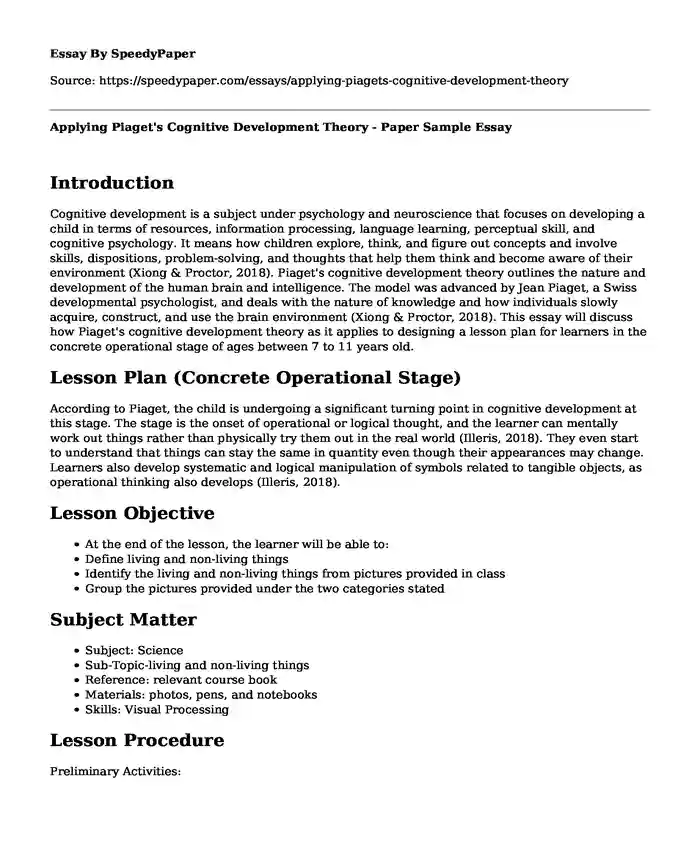
| Type of paper: | Essay |
| Categories: | Education Cognitive development |
| Pages: | 3 |
| Wordcount: | 650 words |
Introduction
Cognitive development is a subject under psychology and neuroscience that focuses on developing a child in terms of resources, information processing, language learning, perceptual skill, and cognitive psychology. It means how children explore, think, and figure out concepts and involve skills, dispositions, problem-solving, and thoughts that help them think and become aware of their environment (Xiong & Proctor, 2018). Piaget's cognitive development theory outlines the nature and development of the human brain and intelligence. The model was advanced by Jean Piaget, a Swiss developmental psychologist, and deals with the nature of knowledge and how individuals slowly acquire, construct, and use the brain environment (Xiong & Proctor, 2018). This essay will discuss how Piaget's cognitive development theory as it applies to designing a lesson plan for learners in the concrete operational stage of ages between 7 to 11 years old.
Lesson Plan (Concrete Operational Stage)
According to Piaget, the child is undergoing a significant turning point in cognitive development at this stage. The stage is the onset of operational or logical thought, and the learner can mentally work out things rather than physically try them out in the real world (Illeris, 2018). They even start to understand that things can stay the same in quantity even though their appearances may change. Learners also develop systematic and logical manipulation of symbols related to tangible objects, as operational thinking also develops (Illeris, 2018).
Lesson Objective
- At the end of the lesson, the learner will be able to:
- Define living and non-living things
- Identify the living and non-living things from pictures provided in class
- Group the pictures provided under the two categories stated
Subject Matter
- Subject: Science
- Sub-Topic-living and non-living things
- Reference: relevant course book
- Materials: photos, pens, and notebooks
- Skills: Visual Processing
Lesson Procedure
Preliminary Activities:
- Salutation
- Checking attendance
- Classroom management
Review:
Recap of what was previously learned.
Introduction of the new Topic:
- The teacher will introduce the topic by asking the learners about their knowledge on the topic. The step will serve to determine their prior knowledge (entering behavior) on the topic.
- The teacher will help the learners define both living and non-living things and inform learners that living things include plants and animals, while non-living things are also called objects.
Practical:
- The teacher displays assorted pictures of plants and animals.
- Learners respond to the teacher’s salutation.
- Learners participate in attendance check and classroom management.
- Learners review what they learned in the previous lesson.
- Learners respond by stating their knowledge about living and non-living things.
- Learners take notes from the teacher’s lecture.
- Learners identify the living and non-living things from the pictures provided.
- Learners note down the names of the objects in the pictures.
- Learners group the pictures provided under the two categories earlier stated (this can be done as individuals or in groups).
Conclusion
As learners join elementary school age, their ability to represent events and ideas more logically and flexibly and logically develops. They become able to solve problems more systematically than previously, hence performing several academic tasks. In the concrete operational stage, a learner may unconsciously understand that no change occurs if nothing is added or subtracted from the initial. Such a simple rule helps them understand specific science and arithmetic concepts and tasks, such as subtractions and classroom science experiments. Piaget referred to this level as the concrete operational stage given that learners start to operate mentally on concrete events and objects. They are, however, not yet able to think systematically concerning representations of events or objects. Manipulation is a more abstract skill that they develop later at the adolescent stage.
References
Illeris, K. (2018). An overview of the history of learning theory. European Journal of Education, 53(1), 86-101. https://onlinelibrary.wiley.com/doi/pdf/10.1111/ejed.12265
Xiong, A., & Proctor, R. W. (2018). Information processing: The language and analytical tools for cognitive psychology in the information age. Frontiers in psychology, 9, 1270. https://www.frontiersin.org/articles/10.3389/fpsyg.2018.01270/full
Cite this page
Applying Piaget's Cognitive Development Theory - Paper Sample. (2023, Dec 29). Retrieved from https://speedypaper.com/essays/applying-piagets-cognitive-development-theory
Request Removal
If you are the original author of this essay and no longer wish to have it published on the SpeedyPaper website, please click below to request its removal:
- Essay Sample with a Personal Statement for Chevening Scholarship Program
- Essay Sample: Language as a Mask in Bruce Norris' Clybourne Park
- Essay Sample on Alice in Wonderland and the World Today
- Adulthood Learning - Book Review Essay Example
- Free Essay with a Personal Development Plan
- Paper Example. Personality Assessment
- The Foundational Strengths of US Marine Corps - Free Paper Sample
Popular categories




